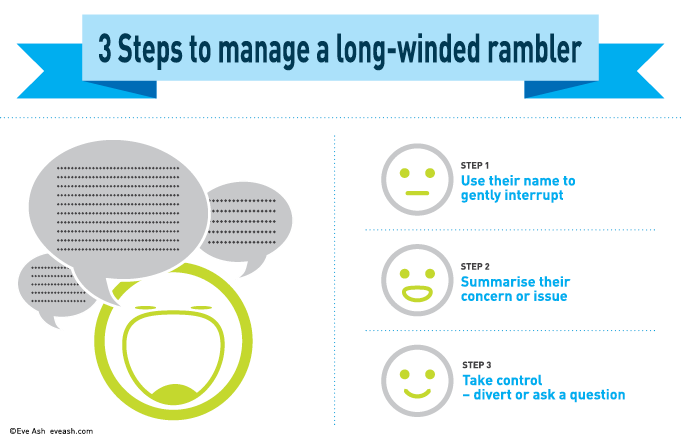At some stage in our lives, we’ve all learned to be polite and not interrupt when someone is speaking.
But what if they talk on and on and don’t stop! How long can you let it go on?
How do you feel?
Bored
Angry your time is being wasted
Sorry for the person that they can’t be succinct
Wishing they would learn to cut to the chase
Amazed that they can’t interpret glazed eyes looking back at them
Planning an escape
Annoyed you have to make up reason to go
At work we can’t afford to have wasted time.
But what if it is our boss, our client, our valued teammate who is long-winded?
Here is a powerful three-step professional strategy for you to interrupt with elegance.
STEP 1: Use their name to gently interrupt
Maintain pleasant eye contact (not a frustrated angry look). If you interrupt and start talking, of course, it sounds rude.
But when you use someone’s name in a calm, polite voice, it really makes a difference.
It’s usually better not to say “excuse me for interrupting” or “I’m sorry to interrupt” because that announces what you are doing as an interruption.
STEP 2: Summarise their concern or issue
Be respectful of what they have been trying to say. Use empathy if it is an issue laden with feelings of frustration: “It sounds like with all the changes, it’s going to be difficult to deliver on deadline.” “It seems like there are three urgent issues that need to be fixed, and you need some help.” “That’s been an amazing trip for you and your family”.
Invariably they will be pleased you have listened and understood, so will not see it as an interruption.
The important thing is to WAIT until you have really listened to the point of the story.
Wait until you understand their concerns, before you even start Step 1.
STEP 3: Take control – divert or ask a question
The danger in point two is that it opens the floodgates and unleashes a further onslaught of talk. SO make sure you have a good step three in place – where you take back control and direction of the conversation. You do this by asking a closed question that gets to the end of that topic, or ideally redirect the flow to a new topic. You talk about a forthcoming project, meeting or ask a factual work-related question.
One exception to this strategy might be that a long story is being unfolded and the punchline or end has not been reached and you have an appointment to go to, or an urgent task to be done. OK in that case, say ”My apologies, I need to go… I need to complete … by …” “I’ll have to hear end of story later”.
Sometimes, we respond to long-winded colleagues with a frustrated expression because it is so common. If you are working with someone who seems to waste a lot of time getting to the point, take them aside one day and give them the feedback that perhaps no one else has been courageous enough to do.
Explain that they often take a while to CUT TO THE CHASE. Give a recent example. Say that you appreciate their stories but with all the work pressures you are starting to feel rude as you need to cut them off. One of my favourite staff members from many years ago told long stories and after giving her feedback – part way through the story – she would even say “OK, cut to the chase” – and deliver a powerful fast ending herself – with no interruption. And we would both smile.

